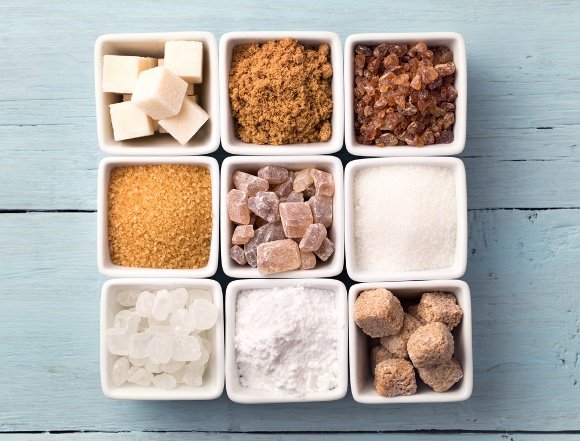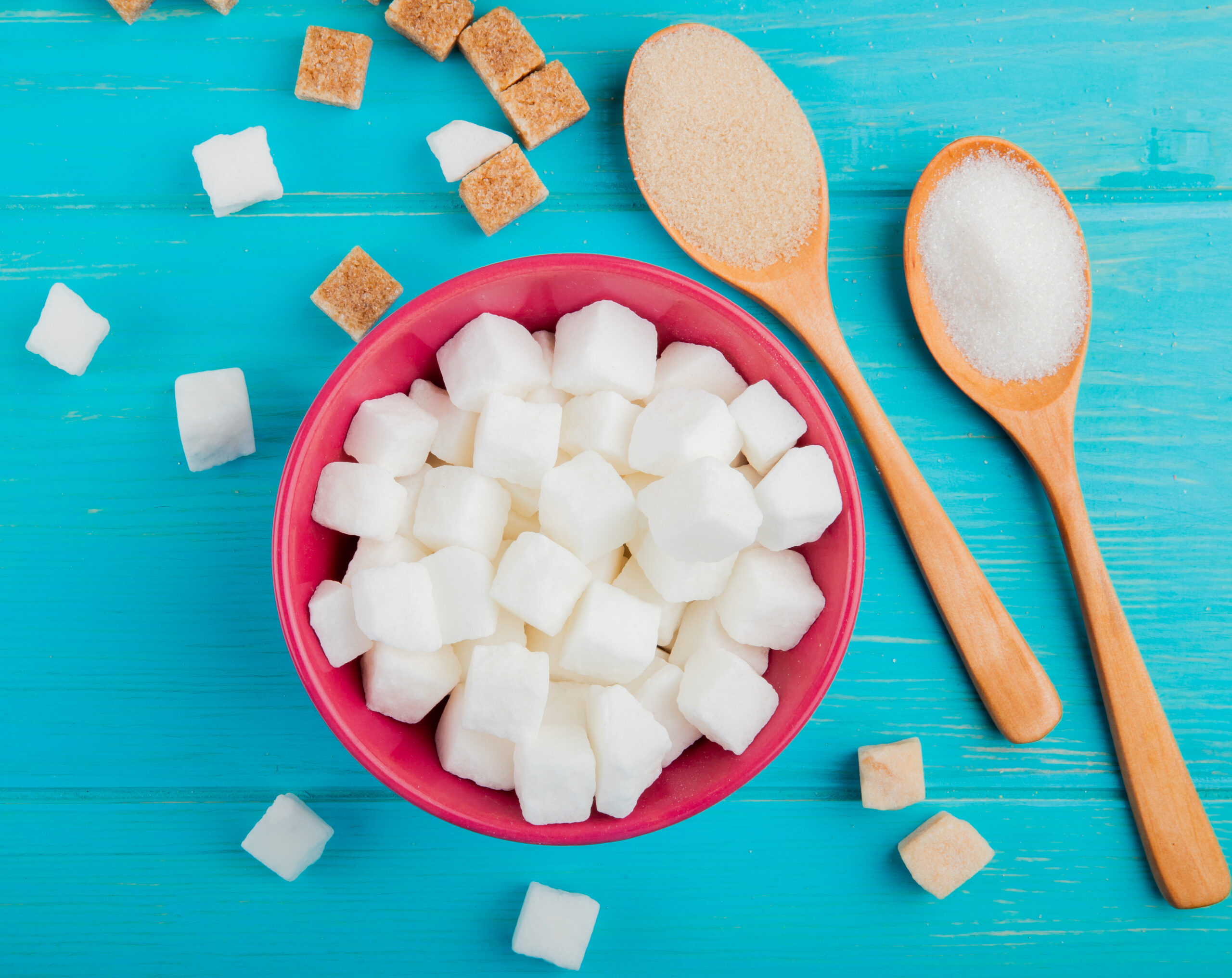In this article, we will explain to you about What is Sugar? Types of Sugar and Disadvantage of Sugar.
Table of Contents
Introduction -What is Sugar?
Sugar is a carbohydrate commonly used as a sweet and savory ingredient in many foods and beverages. It is a substance found in many plants, especially sugar cane, sugar beet, and fruits. In general, sugar is in the class of compounds called carbohydrates, which contain carbon, hydrogen, and oxygen atoms.
The most common sugar is sucrose, which is made up of glucose and fructose molecules. When we eat sugar, our body breaks down sucrose into the sugars glucose and fructose and uses it for energy.
Sugar has been an important part of the human diet for centuries, making sweets and soft drinks. It not only improves the taste but also plays a role in the texture and preservation of many foods. However, eating too much can lead to poor health.
Eating too much can cause weight gain and obesity. It is a calorie-dense product that provides energy but has no significant nutritional value.
It should be noted that not all desserts are created equal. For example, the sugars in fruits and vegetables contain fiber, vitamins, and minerals, making them a healthier choice than added sugars in foods and beverages.
For a healthy diet, limit added sugar and choose healthy alternatives such as fruit, soft drinks, and sugary foods such as honey or maple syrup. Understanding the role of sugar in our diet and making smart choices leads to overall health and well-being.
Type of Sugar
We have already explained about what is Sugar? now Below is a detailed description of the different types of sugar and more details on each.

Type of Sugar
Sucrose: Sucrose is the sweetest and most used form of sugar. It is a disaccharide formed by the combination of glucose and fructose molecules. Sucrose is extracted from sugar or sugar beets and is commonly used as a sweetener in baking, cooking, and drinking. It comes in many forms, including granulated, powdered, and brown sugar.
Glucose: Glucose, also known as dextrose, is a simple sugar that is our body’s main source of energy. It is a simple sugar that is absorbed directly into the bloodstream. Glucose is found in fruits, vegetables and honey. In the food industry, dextrose is often used as an ingredient in soft drinks, soft drinks, food, and as a sweetener for some medicinal purposes.
Fructose: Fructose is another simple sugar found in fruits, vegetables, and honey.
It is the sweetest sugar and is used as a sweetener in many foods and beverages. Fructose is often used as a sweetener in products such as soft drinks, juices, and baked goods. It can be extracted from fruits (except corn) and converted into high fructose corn syrup (HFCS) for commercial use.
High-Fructose Corn Syrup (HFCS): High-Fructose Corn Syrup is a sugar syrup made from corn. It is produced by enzymatically converting the glucose in corn syrup to fructose.
HFCS is widely used in the food and beverage industry as an inexpensive substitute for sucrose. It is found in many foods, including soft drinks, canned fruit, desserts, and sauces.
Lactose: Lactose is a disaccharide found in milk and dairy products. It contains glucose and galactose molecules, which are the main sugars of milk. Lactose is broken down by the lactase enzyme in our body, allowing us to digest it. Some people are lactose intolerant, meaning they lack the lactase enzyme needed to properly digest lactose.
Maltose: Maltose is a disaccharide containing two glucose molecules. It is formed when starches found in grains such as barley and wheat are broken down by the action of enzymes. Maltose has a slightly sweet taste and is used in the fermentation and fermentation processes, as well as in the manufacture of confectionery and baked goods.
Galactose: Galactose is a simple sugar that has less than other sugars. It is found in small amounts in dairy products and some fruits, vegetables, and legumes. Galactose combines with glucose to form lactose in milk. It is an essential building block of glycolipids and glycoproteins and plays an important role in cellular structure and function.
Xylitol: Xylitol is a natural sugar alcohol obtained from plants, especially birch. It is similar to sugar for sucrose but contains fewer calories. Xylitol is often used as a sugar substitute in gums, desserts, and oral care products because it is non-cariogenic and does not promote tooth decay.
Erythritol: Erythritol is another alcohol found in some fruits and fermented foods. It has a sweet taste but provides few calories. Erythritol is often used as a sugar substitute in low-sugar and low-calorie foods. It is also suitable for diabetics as it does not affect blood sugar.
These are some of the main sugars found in many foods and beverages. It is worth noting that excessive consumption of added sugar can have an impact on health, so it is recommended to drink in moderation as part of a good diet.
What is Natural Sugar and Refined Sugar?
We have already explained about What is Sugar and Type of Sugar now let’s explained Natural sugar and refined sugar are two types of sugar that differ in their processing and nutritional properties.
Natural sugars: Natural sugars are sugars found naturally in many foods, including fruits, vegetables, and dairy products. It contains two main types of sugar: fructose and lactose.
1) Fructose: Fructose is a sugar found in fruits, honey, and some root vegetables. It has a sweet taste and is often used as a sweetener in foods and beverages.
2) Lactose: Lactose is a disaccharide found in milk and dairy products. It contains glucose and galactose molecules, which are the main sugars of milk. Lactose is broken down by the lactase enzyme in our body, allowing us to digest it. Some people are lactose intolerant, meaning they lack the lactase enzyme needed to properly digest lactose.
When consumed in foods such as natural sugar, fruit, or milk, it contains important nutrients such as fiber, vitamins, minerals, and antioxidants. These nutrients help reduce sugar absorption and provide other health benefits.
Refined Sugar: Refined sugar, also known as sucrose or white sugar, is obtained from sugar cane or sugar beet through a refining process in which the juice of the plant is extracted and purified.
This process removes impurities, plant extracts, and minerals, resulting in products that are almost entirely sucrose.
Refined sugar is commonly used in food, baked goods, and beverages because of its ability to add sweetness, improve flavor, and improve texture. It is often added to foods in large quantities, raising concerns about the excessive consumption of added sugars in today’s diet.
Refined sugar provides empty calories, provides energy, but has no significant benefit. It lacks the fiber, vitamins, and minerals found in natural sugars and the health benefits that come with it.
While natural sugars are generally thought to be healthier than refined sugars, it’s worth noting that too much can be harmful to health, such as weight gain, increased risk of chronic diseases (such as diabetes, heart disease), and dental problems. A moderate and balanced diet is essential for good health.
Advantage and Disadvantage of Sugar
Let’s discover each of the advantages and disadvantages of sugar:
Benefits of Sugar: Sugar Intake and Sugar Detox Guidelines?
1) Brief strength enhancement: Sugar is a supply of carbohydrates, that are the body’s number one energy source. ingesting sugar can offer a brief burst of power, making it useful for athletes or individuals accomplishing extreme bodily pastimes.
2) Enhancing flavor: Sugar is commonly used in cooking and baking to beautify the taste of meals and beverages. It adds sweetness and might assist balance and rounding out flavors in diverse recipes.
3) Protection and texture development: Sugar has preservative houses, helping to extend the shelf existence of positive foods by way of inhibiting microbial increase. similarly, sugar can enhance the texture of baked items, giving them an applicable wet and soft consistency.
Disadvantages of Sugar: Shocking facts about Sugar
1) fitness risks: immoderate sugar intake is associated with numerous health risks. it is able to make a contribution to weight advantage, obesity, and associated situations inclusive of type 2 diabetes, heart disorder, and sure styles of most cancers. excessive sugar intake is also linked to an expanded threat of dental troubles, which includes tooth decay and cavities.
2) Nutrient deficiencies: Sugar offers energy but lacks crucial nutrients. when consumed in extra, sugary foods and drinks can displace extra nutritious options in the food regimen, doubtlessly main to nutrient deficiencies.
3) Blood sugar spikes and crashes: eating sugary foods and drinks reasons a speedy increase in blood sugar tiers, followed by a next drop. this can bring about fluctuations in strength levels, temper swings, cravings, and an accelerated threat of developing insulin resistance over the years.
4) Dependency and overconsumption: Sugar can spark off the mind’s reward centers, main to cravings and ability addictive behaviors. this may make it difficult for individuals to slight their sugar intake and can make a contribution to overconsumption.
5) Empty calories: Sugar is calorie-dense but gives little to no dietary value. food and drinks high in added sugars regularly comprise “empty calories,” which means they make a contribution to general calorie intake without offering crucial nutrients, minerals, or fiber.
6) Impact on intellectual fitness: even as extra studies are needed, some studies have recommended a capacity link between excessive sugar intake and an accelerated danger of intellectual fitness issues which include despair and tension.
it’s really worth noting that not all sugars are created the same. natural sugars determined in the end result, as an example, come packaged with fiber, water, and various nutrients, making them a healthier choice compared to introduced sugars discovered in processed foods and liquids. Moderation and conscious consumption of sugar are key to preserving a balanced and wholesome weight loss program.

